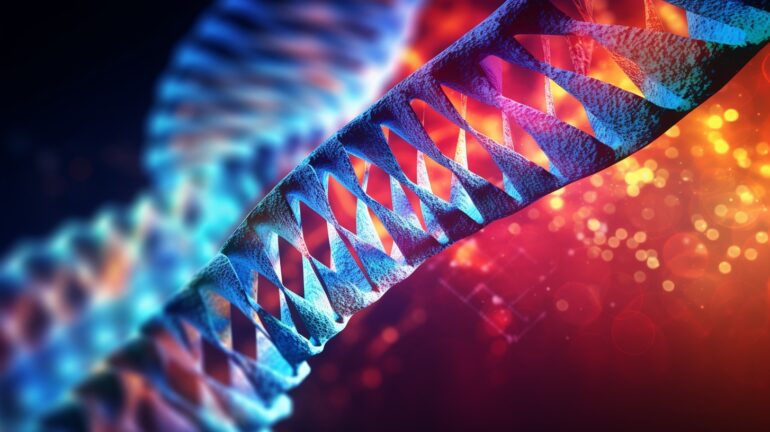TL;DR:
- Google DeepMind’s AlphaMissense AI predicts genetic mutation harm potential, aiding rare disorder research and diagnosis.
- It excels at assessing missense mutations, differentiating between harmful and harmless alterations.
- AlphaMissense analyzed 71 million single-letter mutations, with 90% precision in predicting their impact.
- Researchers provide a free online catalog of predictions to support geneticists and clinicians.
- Only 2% of human missense mutations are classified; AlphaMissense outperforms existing predictors.
- AlphaMissense is derived from AlphaFold, predicting 3D protein structures and ‘speaking’ the protein language.
- While AlphaMissense identifies what’s broken, understanding how it’s broken remains a challenge.
Main AI News:
In a groundbreaking development, scientists at Google DeepMind have harnessed the power of artificial intelligence to address a critical challenge in genomics. Their revolutionary program, AlphaMissense, now stands as a beacon of hope for researchers and clinicians seeking to expedite genetic research and rare disorder diagnoses.
At the heart of this technological marvel lies the ability to predict the potential harm caused by millions of genetic mutations, differentiating between those that are benign and those that might trigger debilitating diseases. AlphaMissense is particularly adept at assessing missense mutations, characterized by a single letter’s misalignment in the DNA code. These seemingly subtle alterations can disrupt protein functionality, leading to a cascade of ailments, ranging from cystic fibrosis and sickle-cell anemia to cancer and neurological disorders.
The scope of AlphaMissense’s capabilities is staggering, as it has meticulously evaluated all 71 million single-letter mutations that could influence human proteins. When calibrated for precision at an impressive 90%, the program accurately identified 57% of missense mutations as likely harmless and 32% as probably harmful, while the remainder remained shrouded in uncertainty.
In a magnanimous gesture towards scientific advancement, the researchers have generously unveiled a free online repository of these predictions. Geneticists and clinicians, embroiled in unraveling the intricate web of mutation-driven diseases or diagnosing patients with rare disorders, can now avail themselves of this invaluable resource.
Considering the staggering statistics, a typical individual carries approximately 9,000 missense mutations within their genetic makeup. Astonishingly, among the 4 million such mutations observed in humans, only a meager 2% have been definitively classified as either benign or pathogenic. While computer programs have previously attempted to forecast disease-inducing mutations, their inherent inaccuracies have limited their role to that of providing supplementary evidence for diagnosis.
The research article published in Science, authored by Dr. Jun Cheng and his esteemed colleagues, expounds upon AlphaMissense’s supremacy over existing “variant effect predictor” programs. This technological leap promises to empower experts in swiftly pinpointing the mutations at the helm of various diseases, potentially uncovering previously uncharted genetic territories, and guiding physicians toward more effective treatments.
Notably, AlphaMissense is a direct descendant of DeepMind’s AlphaFold program, renowned for its ability to predict the 3D structure of human proteins based on their chemical composition. Through a rigorous training regimen involving data from humans and closely related primates, AlphaMissense has learned to distinguish common, likely benign missense mutations from rare, potentially harmful ones. Simultaneously, it has mastered the intricate “language” of proteins by studying millions of protein sequences, grasping the essence of a “healthy” protein.
When confronted with a mutation, this finely-tuned AI system generates a risk score, reflecting the perceived degree of genetic alteration’s peril. However, it is important to note that it does not elucidate the precise mechanism behind the mutation’s adverse effects.
In the words of Dr. Jun Cheng, “This is very similar to human language. If we substitute a word in an English sentence, a person familiar with English can immediately see whether the word substitution will change the meaning of the sentence or not.”
Praising the potential of AlphaMissense, Prof. Joe Marsh, a computational biologist at Edinburgh University, underscores its significance. “We have this issue with computational predictors where everybody says their new method is the best,” he says. “You can’t really trust people, but [the DeepMind researchers] do seem to have done a pretty good job.”
Should clinical experts indeed validate the reliability of AlphaMissense, its predictions may carry substantial weight in future disease diagnoses.
While acknowledging the promise of AlphaMissense, Prof. Ben Lehner, senior group leader in human genetics at the Wellcome Sanger Institute, points out the need for verification by fellow scientists. He also raises a compelling question about the complexity of such models, potentially surpassing our understanding of the biology they seek to predict.
Lehner says, “The DeepMind model does a good job of predicting what is broken. Knowing what is broken is a good first step. But you also need to know how something is broken if you want to fix it. Many of us are very busy generating the massive data needed to train the next generation of AI models that will tell us not only which changes in DNA are bad but also exactly what the problem is and how we might go about fixing things.”
Conclusion:
AlphaMissense represents a monumental leap in genetic research and clinical diagnosis. Its precision in assessing missense mutations and the free online catalog offer invaluable resources. This innovation has the potential to revolutionize disease diagnosis and treatment, making it a game-changer in the healthcare market. However, further validation and understanding of its complexities are essential for its full market integration.

